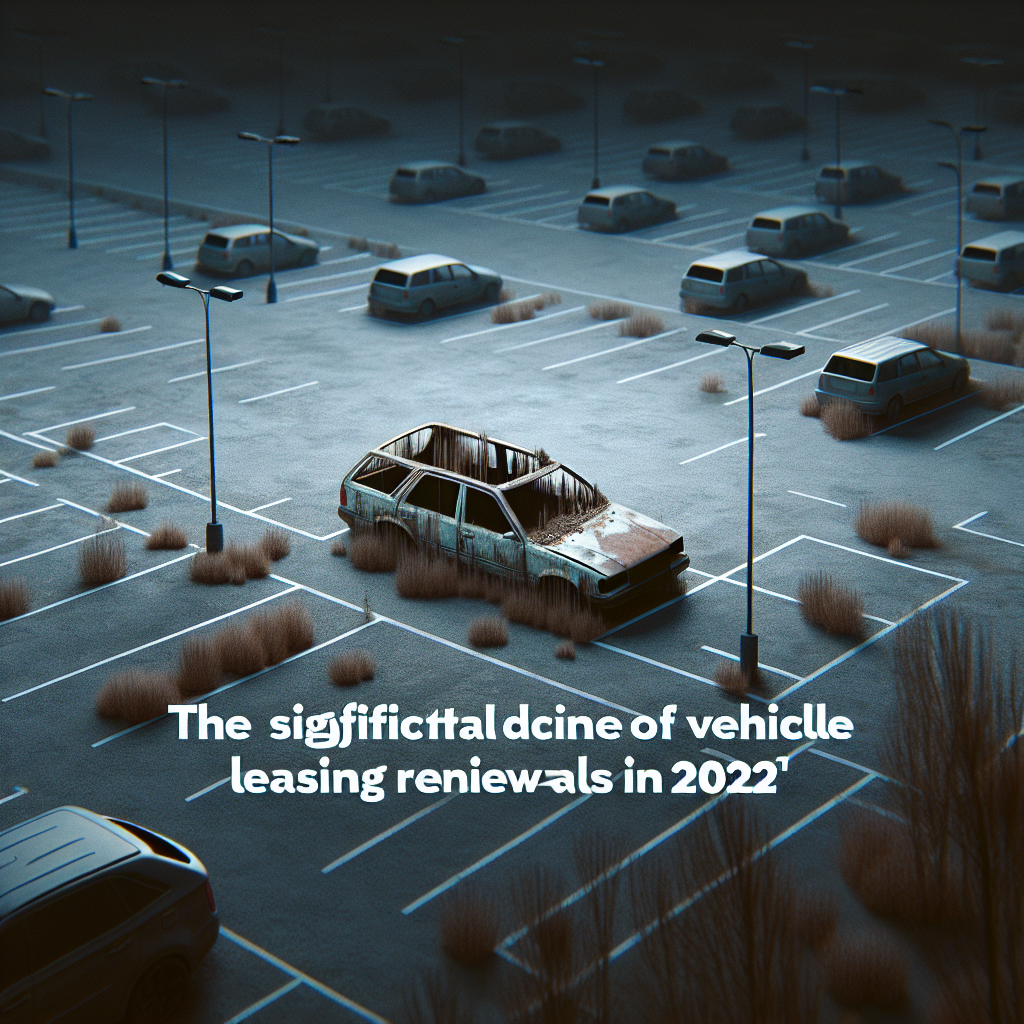In 2022, the vehicle leasing industry witnessed a considerable decline in lease renewals. This decline can be attributed to several factors, including shifting consumer preferences, the accessibility of down payments, and the overall affordability of leasing options. Not only did new car sales in the US decrease by almost 8% in 2022, but used car sales also experienced a decline. Additionally, the market for auto leases plummeted to just 18% in 2022, a significant drop from the 30% recorded in 2019. Astonishingly, only 28% of individuals returning their leases chose to lease again in 2022, a stark contrast to the nearly half that opted for renewals in 2019.

Factors contributing to the decline in vehicle leasing renewals in 2022
Shifting consumer preferences
One of the primary factors contributing to the decline in vehicle leasing renewals in 2022 is the shifting preferences of consumers. Over the past few years, there has been a noticeable change in consumer behavior, with many individuals opting for car ownership rather than leasing. This shift has been driven by several factors, including a desire for higher flexibility and a sense of ownership over their vehicles.
Challenges in accessing down payments
Another significant factor that has contributed to the decline in vehicle leasing renewals is the challenge faced by consumers in accessing down payments. For many individuals, particularly those with lower incomes or limited savings, coming up with the required down payment can be a significant financial hurdle. This challenge has made it difficult for a significant portion of consumers to qualify for vehicle leases, resulting in a decline in renewal rates.
Affordability concerns
Affordability concerns have also played a role in the decline of vehicle leasing renewals in 2022. The rising cost of auto leases, coupled with stagnant wages and a challenging economic climate, has made it increasingly difficult for consumers to afford lease payments. As a result, many individuals have opted for alternative options or delayed leasing decisions, further contributing to the decline in renewal rates.
Impact of declining new car sales on vehicle leasing renewals
Decrease in new car sales in the US
The decline in vehicle leasing renewals can be partly attributed to the decrease in new car sales in the United States. According to industry statistics, new car sales in the US were down nearly 8% in 2022 compared to the previous year. This decline has had a direct impact on the number of new vehicles available for leasing, consequently reducing the pool of potential lease renewals.
Effects on the auto leasing industry
The decrease in new car sales has had significant effects on the auto leasing industry. With fewer new vehicles being sold, there are fewer lease returnees who have the option to renew their leases. This has resulted in a decrease in the overall number of lease renewals, as well as a decrease in the market share of auto leases in 2022.
Effects of declining used car sales on vehicle leasing renewals
Decline in used car sales
Not only did new car sales decline in 2022, but there was also a significant decline in used car sales. The decrease in demand for used cars can be attributed to various factors, including the rise of alternative transport options and the lingering effects of the COVID-19 pandemic. This decline in used car sales has had a direct impact on vehicle leasing renewals, as it has reduced the availability of used vehicles for lease renewals.
Implications for the auto leasing market
The decline in used car sales has had significant implications for the auto leasing market. With fewer used vehicles available for lease renewals, the pool of potential customers has shrunk. This has resulted in a decrease in the overall number of lease renewals, further contributing to the decline in renewal rates seen in 2022.

Decrease in the market share of auto leases in 2022
Comparison between 2022 and 2019 auto leasing market share
The market share of auto leases experienced a significant decrease in 2022 compared to previous years. Industry data reveals that the market share of auto leases fell to 18% in 2022, a substantial decrease from 30% in 2019. This decline highlights a fundamental shift in consumer preferences and behavior when it comes to vehicle acquisition.
Factors contributing to the decline
Several factors have contributed to the decrease in the market share of auto leases in 2022. As previously mentioned, shifting consumer preferences towards car ownership and challenges in accessing down payments have played a significant role. Additionally, the decline in new and used car sales, as well as affordability concerns, have also played a part in the decreasing market share of auto leases.
Impact of reduced lease renewals on the auto leasing industry
Decrease in lease returnees choosing to lease again
One of the direct impacts of reduced lease renewals is the decrease in the number of lease returnees who choose to lease again. Industry data shows that only 28% of lease returnees chose to lease again in 2022, which is a significant decline from nearly half in 2019. This decrease in repeat lease customers has implications for the overall sustainability and profitability of the auto leasing industry.
Consequences for the industry
The decrease in lease renewals has significant consequences for the auto leasing industry. With a smaller pool of repeat customers, leasing companies must work harder to attract and retain new customers. This may involve offering more competitive lease terms and incentives, as well as enhancing the overall customer experience. Failure to address the decline in renewal rates could result in further declines in market share and profitability for the industry.
Alternative options to vehicle leasing in 2022
Increased interest in car ownership
As mentioned earlier, there has been an increased interest in car ownership as an alternative to leasing in 2022. Many consumers now prefer the higher flexibility and sense of ownership that comes with owning a vehicle outright. This trend has been further fueled by the uncertainties and challenges posed by the ongoing pandemic, leading individuals to prioritize owning a vehicle for personal transportation.
Shift towards car subscription models
Another alternative option to vehicle leasing in 2022 is the shift towards car subscription models. Car subscription services offer customers the convenience of a monthly subscription fee that covers the costs of vehicle ownership, including insurance and maintenance. This model provides consumers with a more flexible and hassle-free alternative to traditional vehicle leasing, further impacting lease renewal rates.
Rise in ride-sharing services
The rise of ride-sharing services has also contributed to the decline in vehicle leasing renewals. With the convenience and affordability of ride-sharing options such as Uber and Lyft, many individuals no longer feel the need to lease a vehicle for personal use. Instead, they rely on ride-sharing services as a more cost-effective and convenient alternative, further reducing the demand for lease renewals.
Changes in consumer behavior and preferences
Desire for higher flexibility and ownership
One of the key changes in consumer behavior and preferences that has impacted lease renewals is the desire for higher flexibility and a sense of ownership. Many consumers now value the ability to customize and personalize their vehicles, which is not always possible with leased vehicles. The trend towards car ownership is driven by the desire to have full control over their vehicle and the freedom to make modifications as desired.
Preference for used cars over leases
Another notable change in consumer behavior is the increasing preference for used cars over leases. Many individuals now recognize the value and cost savings associated with purchasing a used car instead of leasing a new one. This preference for used cars is influenced by factors such as lower upfront costs and the ability to build equity in a vehicle over time, making it a more attractive option than vehicle leasing for many consumers.
Concerns regarding mileage limitations and penalties
Concerns regarding mileage limitations and penalties have also impacted consumer preferences and decisions when it comes to vehicle leasing renewals. Lease agreements typically come with mileage restrictions, and exceeding these limits can result in additional fees and penalties. This has made many consumers hesitant to renew their leases, as they worry about potential financial implications if they exceed the mileage restrictions. As a result, some individuals opt for alternative options that do not come with such limitations.
Financial challenges affecting vehicle leasing renewals
Impact of economic downturn on leasing decisions
The economic downturn experienced in recent years has had a significant impact on leasing decisions. During times of economic uncertainty, many individuals prioritize financial stability and opt for more cost-effective transportation options. As a result, leasing a vehicle may not be financially feasible for many consumers, leading to a decrease in lease renewals.
Difficulties in securing down payments
Securing down payments has proven to be a significant hurdle for many consumers, especially those with limited financial resources. The importance of down payments in lease agreements makes it difficult for individuals to qualify for leases if they are unable to meet the required down payment. This financial challenge has contributed to the decline in vehicle leasing renewals, as many individuals are unable to move forward with leases due to difficulties in securing down payments.
Rising cost of auto leases
The rising cost of auto leases has also contributed to the decline in renewal rates. Higher lease payments make it increasingly challenging for individuals to afford leasing a vehicle, especially when combined with other financial obligations. As lease payments continue to increase, many consumers opt for more cost-effective alternatives, resulting in a decrease in lease renewals.
Strategies for the auto leasing industry to address renewal decline
Offering attractive lease terms and incentives
One strategy for the auto leasing industry to address the decline in lease renewals is to offer more attractive lease terms and incentives. This may include lower monthly payments, reduced down payment requirements, or longer lease terms. By making leases more financially appealing and flexible, leasing companies can attract more customers and increase renewal rates.
Exploring creative financing options
Another strategy is for the auto leasing industry to explore creative financing options. This may involve partnering with financial institutions to offer tailored financing solutions for consumers who have difficulty securing down payments or meeting lease requirements. By providing flexible financing options, leasing companies can make vehicle leases more accessible and increase renewal rates.
Enhancing customer experience and support
Improving the overall customer experience and support is also crucial in addressing the decline in lease renewals. This may involve investing in technology and digital platforms to streamline the leasing process and provide customers with convenient and efficient service. Additionally, offering personalized support and assistance throughout the lease duration can help build customer loyalty and increase renewal rates.
Long-term outlook for vehicle leasing renewals
Predictions for future trends
The long-term outlook for vehicle leasing renewals will be shaped by various factors and trends. One of the key predictions for the future is that consumer preferences will continue to shift towards car ownership, driven by a desire for flexibility and the sense of ownership that comes with owning a vehicle outright. This shift in preferences may further impact lease renewal rates in the coming years.
Factors that may influence renewal rates
Several factors may influence renewal rates in the future. Economic conditions, including the recovery from the ongoing pandemic and changes in disposable income, will play a significant role. Additionally, advancements in technology and alternative transportation options may impact consumer preferences and influence lease renewal decisions. The auto leasing industry must adapt and innovate to address these factors and maintain a competitive position in the market.
In conclusion, the decline in vehicle leasing renewals in 2022 can be attributed to shifting consumer preferences, challenges in accessing down payments, and affordability concerns. The decrease in new car sales and used car sales has also had a significant impact on lease renewals. The market share of auto leases has decreased, resulting in consequences for the industry. Alternative options to vehicle leasing, such as car ownership, car subscription models, and ride-sharing services, have gained popularity. Changes in consumer behavior and preferences, along with financial challenges, have further contributed to the decline in renewal rates. To address this decline, the auto leasing industry can offer attractive lease terms and incentives, explore creative financing options, and enhance customer experience and support. The long-term outlook for vehicle leasing renewals will be influenced by future trends and factors such as economic conditions and advancements in technology.
Please rate this post

With over 20 years of experience in the car business, I’ve navigated the evolution of the industry from traditional sales to the dynamic digital age. My journey through various roles in both sales and management has endowed me with a unique perspective on the challenges and opportunities in automotive sales today.
As the founder of Shawn Ryder Digital, I combine my extensive background in technology with my deep understanding of the automotive industry. This synergy allows me to craft digital marketing strategies that are not just effective but tailored to the specific needs of each dealership. My commitment is to drive your sales, enhance your brand awareness, and ensure your dealership thrives in the digital landscape.
Here at Shawn Ryder Digital, we’re not just about providing services; we’re about building partnerships. As I often say, “In the fast-paced world of digital marketing, staying ahead isn’t just an option; it’s a necessity.”
Together, let’s embrace the challenges of the digital age and turn them into opportunities for growth and success. Join me in redefining the future of automotive digital marketing. Let’s accelerate your dealership’s journey to the top.
